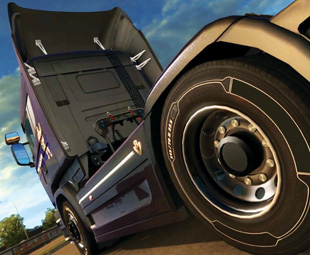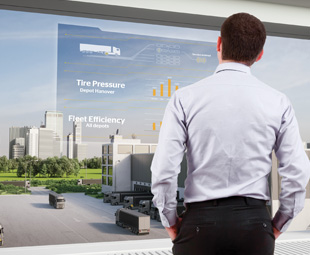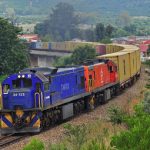Don’t tire of tyres

As the second-highest variable cost factor in a long-distance trucking operation, truck owners and fleet managers cannot afford to ignore the management and control of the tyres in their fleet, says VIC OLIVER
With the high spike in fuel costs that South Africa has witnessed over the last few years, many long-distance truck operators have applied their full focus to fuel consumption and neglected the management of tyres.
Computer simulations of long-distance, heavy-vehicle operation cost studies show that the tyre costs on a truck tractor covering 180 000 km a year, coupled to a set of interlink trailers, are R185 112 a year. This equates to 10,2 percent of all the variable operating cost factors.
There are many aspects to managing the tyres in a fleet. One of the best ways is to install a system that accurately accounts for all the related costs, which can then be tabled to give the operator a true cost per kilometre (CPK) for each and every tyre in the fleet.
The total CPK is not what the tyre costs to purchase, but the costs from the time of purchase to the time that it is removed and scrapped.
Accurate tyre CPK information will assist operators to effectively manage their tyres in the following ways:
• Highlight problem areas and assist them to take immediate action to rectify any problem contributing to excess tyre costs on a vehicle;
• Measure performance of each depot against others in the group;
• Measure the company’s performance against industry standards;
• Highlight driver abuse;
• Highlight problems related to vehicles and trailers;
• Provide the information to assist in the selection of the correct tyre for a particular operation.
One of the basic functions of good tyre management is to ensure that the tyre pressures are always correct and that all tyres are fitted with valve caps and valve extensions on the dual wheels.
Often drivers feel that managing tyres is not their responsibility. Because it is often not part of their job description, they assume that it is someone else’s job; either the person employed by the outsourced tyre management company or their own workshop personnel.
Experience has shown that tyre costs will rise if their care is left to these people, and the driver is not involved as part of the team ensuring that the tyres are correctly inflated at all times.
Beware of the poor practice of bleeding tyres after they have been running and warmed up. In this instance, they will have increased pressure above their starting pressure. This is normal as air expands when heated. Therefore, lowering the pressure of a warm tyre will result in the tyre being under inflated once it has cooled.
Other factors that need to be taken into consideration when selecting the route the vehicle will travel that will affect tyre life are:
• Road conditions – winding roads with high hedges, or other obstructions to vision, cause frequent braking, acceleration and side thrust on the tyres.
• Steep hilly roads – these tend to increase wear, due to the high tractive effort plus braking and acceleration.
• Road surface – where possible, avoid roads that are in a poor condition. Often it is better to take a longer route.
• Proper management of the tyres in a fleet will reduce variable operation costs and increase the safety of the company’s vehicles on the
road.
Continental makes it easy to connect to your tyres
It’ll soon be easier than ever before to monitor and analyse tyre performance, thanks to Continental’s new ContiConnect tyre information and management system.
 The system – which was previewed in September, at the IAA Commercial Vehicles Show in Hanover – analyses and reports tyre pressure and temperature for the entire fleet, based on data collected by the ContiPressureCheck sensors.
The system – which was previewed in September, at the IAA Commercial Vehicles Show in Hanover – analyses and reports tyre pressure and temperature for the entire fleet, based on data collected by the ContiPressureCheck sensors.
“With ContiConnect we take a huge step forward in our evolution from a premium tyre manufacturer to a solutions provider. We enrich our long-term experience in the tyre industry with data created by sensors in our truck and bus tyres,” says Nikolai Setzer, member of the Executive Board at Continental and head of the tyre division.
The system can work in multiple set-ups to connect all tyres in a fleet. In combination with the modular design of ContiPressureCheck, it allows for the collection of data with a stationary receiver in the depot, or with a receiver unit in every vehicle, on a real-time basis while on the road.
Should the tyres reach a critical level, the system notifies the fleet manager and offers advice on corrective measures that can be undertaken.
An online portal provides transparent reports on the fleet’s tyre performance and overall efficiency. The result is more mileage, longer durability and greater fuel savings. This means higher uptime, less maintenance, and overall success in mobility and efficiency for the entire fleet.
“For our customers this means a change from manual and routine tyre care to automatic monitoring and targeted care. They profit from our unique combination of competences in-house: with profound know-how on tyres as well as on sensors and vehicle-related data. This makes Continental the perfect partner in an ever digitalising logistics world,” Setzer adds.
ContiConnect works with both retrofitted and factory-fitted ContiPressureCheck sensors such as those included within the new Continental iTyre.
Furthermore, the ContiPressureCheck system, which gives input to ContiConnect, is compatible with a broad variety of fleet management systems on the market, including solutions that come from different original equipment and aftermarket manufacturers.
Unfortunately, ContiConnect will only be available in key markets in Asia Pacific, Europe and the Americas when it launches during 2017.
One of this country’s most respected commercial vehicle industry authorities, VIC OLIVER has been in this industry for over 50 years. Before joining the FOCUS team, he spent 15 years with Nissan Diesel (now UD Trucks), 11 years with Busaf and seven years with International.
Published by
Focus on Transport
focusmagsa




